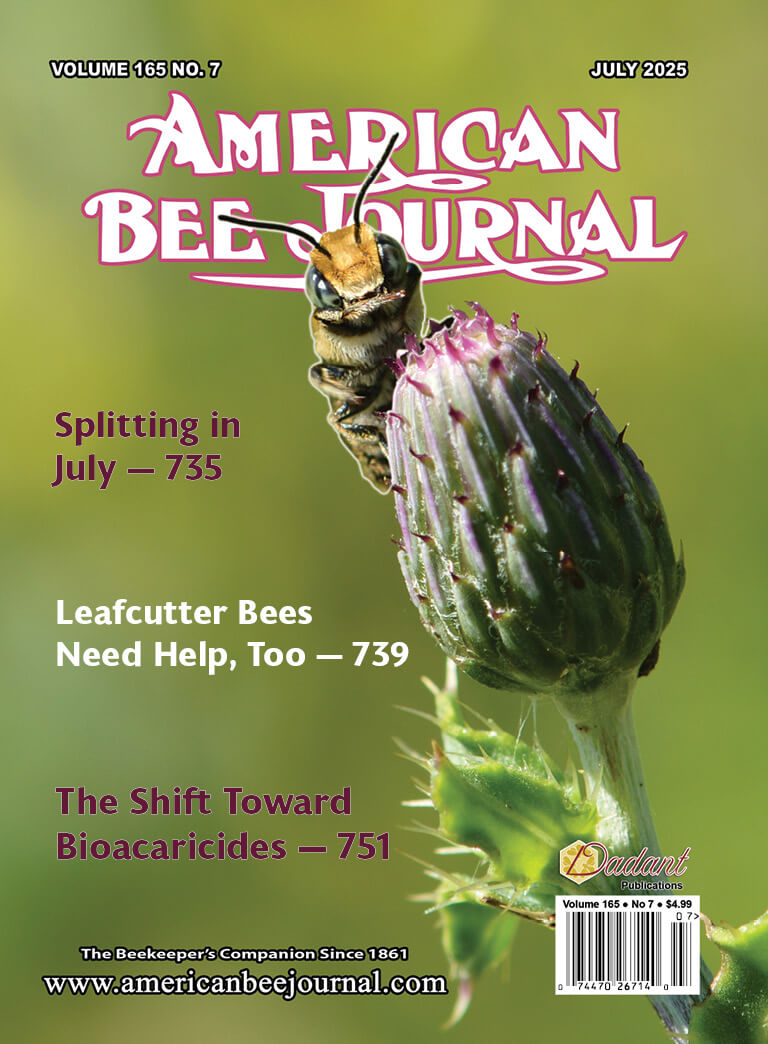Q Wax Moth Migration …. Nope
A friend of mine in the bee club said that she knows when the wax moths fly in the spring… it’s when, here in the north, oak leaf bud is the size of squirrel’s ear. Have you heard that before?
B in Ohio
A
As we enter the late stages of summer and Varroa levels have risen and colony health is being compromised daily, this is one of the times wax moths, which are secondary “predators’, are seeking out and taking advantage of weakening colonies that can’t protect themselves. NO colony dies from wax moths (or small hive beetles). Wax moth adults most likely die in the winter in the north. The hardiest of the life stages, the egg, survives over winter and hatches when the season changes and the wax moth larva eats other stuff than a honey bee colony’s stored resources. That is why they can appear so quickly. They are not migrating adults. They are always around at some life stage.
You may have heard news reports lately that wax moth larvae can eat polyethylene and polypropylene, which are the main types of plastic found in ‘our’ waste stream. They are being touted as perhaps a means to reduce this ordinarily very robust plastic waste.
This is from a past paper on wax moths:
“Less usual foods that have been reported[3] are dried vegetable remains, dried fruits (especially apples and raisins), horn shavings (an organic fertilizer), cork and even refined sugar. They will also burrow into soft wood.”
GRABE, ALBERT (1942): Eigenartige Geschmacksrichtungen bei Kleinschmetterlingsraupen [“Strange tastes among wax moth caterpillars”]. Zeitschrift des Wiener Entomologen-Vereins27: 105-109 [in German].
Great Classroom question☺ Thanks.
Q Liability
Hi Jerry,
I would like to sell my surplus honey to local stores. How can I be safe from liability?
Mac in Maine
A
Our pastime in the US is not baseball, football or basketball. It is suing each other.
I would talk to the stores you are considering to get their consent and advice. I would visit with your insurance agent who sold you your car, home and personal liability policy. There are also insurance companies advertising in this magazine who specialize in beekeeper’s insurance.
Google the National Honey Board (NHB) and ask them for advice. The chances of someone eating your honey, having an allergic reaction and getting sick or dying are super slim but not zero. Then, make your decision.
Q One of Four Thousand
Jerry, can you tell me what kind of bee this is. There are lots of them making holes (nests?) in the ground. This is in the western piedmont of North Carolina. Thanks in advance for your answer.
Eddie White
A
Good morning Eddie. There are about 4000 different species of ‘bees’ in the US and many of them are ground nesting bees. I haven’t memorized what all of them look like yet. I am only up to 2397☺ Take a look at the links I found for you below. They give some general overview and more importantly some contacts within North Carolina for more information if you need it. Take care. Jerry
https://caldwell.ces.ncsu.edu/2014/06/ground-digging-bees/
http://ncurbanpests.blogspot.com/2014/03/ground-bees-active-but-pose-no-threaten.html
https://www.ces.ncsu.edu/depts/ent/notes/Ornamentals_and_Turf/lawn/note100/note100.html
Q The Small Hive Beetle as a Disease Vector
In the May issue, Robert Weast in an article called “Absconding, the Mysterious Disappearance of Colonies” states, “Many states now have populations of the hive beetle and this vector appears to be spreading throughout the United States…”
I wasn’t aware that hive beetles were vectoring any disease, and now I’m curious to know exactly what is being spread by them. Mr. Weast leaves it there, without further explanation. Can you shed any light on this?
Rusty Burlew
A
How about moving American foulbrood spores….http://www.apidologie.org/articles/apido/full_html/2010/01/m08154/m08154.html
And maybe viruses….http://www.apidologie.org/articles/apido/full_html/2009/04/m08087/m08087.html
I hope these two Apidologie articles help.
Q Are Bees Safe?
“New Data Unearths Pesticide Peril in Beehives”
https://www.sciencedaily.com/releases/2017/04/170420171509.htm
What do you think Jerry Bee-man Hayes? Is this Cornell study reputable?
Marcel
A
The short answer is that it is reputable. The longer answer is that years ago in Florida after we named this thing CCD, we took samples of beebread and comb from our research colonies outside Gainesville to analyze for…


